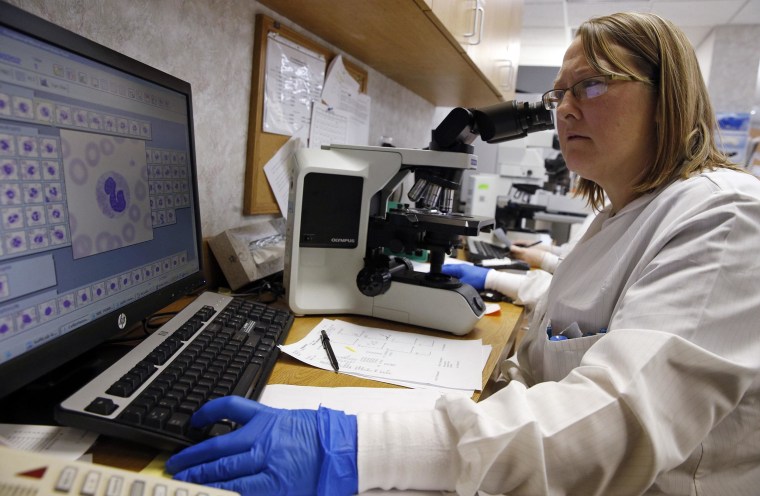Federal health officials backtracked Wednesday, saying an Illinois man believed to be infected with the mysterious new MERS virus didn’t have signs of the disease after all.
A more sensitive blood test came back negative for Middle East respiratory syndrome in the man who was originally thought to have been infected by the first U.S. MERS case, an Indiana health worker who contracted the virus in Saudi Arabia, officials with the Centers for Disease Control and Prevention said.
"After completing additional and more definitive laboratory tests, our experts have now concluded that the Indiana patient did not spread the virus to the Illinois patient," Dr. David Swerdlow, who's leading the CDC's MERS response, told reporters.
The infection would have been the first instance of person-to-person spread of MERS in the U.S., a potentially worrisome development for the virus that surfaced in 2012 and has sickened at least 635 people and killed 193 worldwide. MERS is believed to have mortality rate of 30 percent, experts say.
"After completing additional and more definitive laboratory tests, our experts have now concluded that the Indiana patient did not spread the virus to the Illinois patient."
CDC officials originally said the two men, who are business associates, met twice, including one 40-minute, face-to-face session, and shook hands, potentially spreading the MERS virus.
Health officials had said the Illinois man tested negative for active infection and had no symptoms of illness, but that blood tests showed he had developed antibodies that were apparent evidence of past infection with MERS, said Dr. David Swerdlow, who is leading the CDC’s response to the virus.
Now, however, CDC officials say that the bloodwork relies on three separate tests and that while the first two showed evidence of MERS antibodies, the third, more definitive test, which takes longer, came back negative. MERS is also known as MERS coronavirus, or MERS-CoV.
“Based on the results of these tests, which require careful interpretation, CDC has concluded that the Illinois resident was not previously infected with MERS-CoV,” officials said.
CDC officials appeared to defend the premature release of potentially alarming information.
“While we never want to cause undue concern among those who have had contact with a MERS patient, it is our job to move quickly when there is a potential public health threat,” Swerdlow said in a statement. “Because there is still much we don’t know about this virus, we will continue to err on the side of caution when responding to and investigating cases of MERS in this country.”
Swerdlow said the CDC acted quickly in notifying the public and potential contacts of the Illinois man in the interest of transparency and public safety. "We really can't wait until we have all the tests back," he said.
The third test, known as the neutralizing antibody assay, not only takes longer but relies on live MERS virus, so must be conducted in a high-containment lab, a cumbersome and time-consuming prospect, officials added.
CDC officials originally had said the Illinois man was not counted as an active case, but could have been an example of silent MERS infection in people who don’t develop symptoms of the disease. Early research suggests that about 20 percent of the cases show no signs of active infection, but have MERS antibodies in their blood.
The Illinois man has been cooperating with CDC and local health officials, wearing a mask and limiting contact with crowds. Swerdlow said he couldn't describe the man's reaction when he found out he didn't have MERS.
“While we never want to cause undue concern among those who have had contact with a MERS patient, it is our job to move quickly when there is a potential public health threat."
Wednesday's announcement came a week after health officials said the second U.S. case of MERS, a 44-year-old Florida man, had tested negative for the disease and was discharged from the hospital. In addition, follow-up testing on all 23 health workers exposed to the Florida MERS patient showed that they didn’t contract the virus, health officials said. They've since returned to work.
Tests now show that 53 health care workers who cared for the Indiana man, plus household contacts, didn’t catch the virus, either. The man felt ill after returning from Saudi Arabia on April 27 and was confirmed to have MERS on May 2, CDC officials said. Along the way, he took two international flights and a 70-minute bus ride. So far, none of his fellow passengers has evidence of the virus, Swerdlow said.
The good news, CDC officials said, is that the lack of infection in the Indiana man underscores their belief that MERS is not easily spread in community settings and that there is very little danger to the general public.
"It's a little reassuring that this gentleman was not a case," Swerdlow said.
